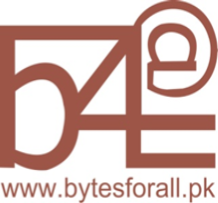Bytes for All, Pakistan (B4A) and the Open Observatory of Network Interference (OONI) project released a research report examining internet censorship in Pakistan.
The report, titled “Internet Censorship in Pakistan: Findings from 2014 to 2017” is available Here.
This study was conducted through the collection and analysis of network measurements from 22 ISPs in Pakistan over the last three years. OONI Probe, which is free software designed to measure internet censorship, was used as part of this study. All network measurement data collected through the use of OONI Probe is published Here.
Upon analysis of the data, we confirm the blocking of 210 URLs in Pakistan. Explicit blockpages were observed for many of these URLs, while others were blocked by means of DNS tampering.
Blocked websites include: ● Sites run by the Baluch and Hazara ethnic minority groups ● Sites hosting content pertaining to the controversial “Everybody Draw Mohammed Day”
● Web proxies, enabling censorship circumvention
Many of the detected censorship events can be legally justified under Pakistan’s Penal Code, which prohibits religious blasphemy. The blocking though of sites related to ethnic minority groups may be politically motivated.
Pakistani ISPs appear to be applying “smart filters”, selectively blocking specific HTTP web pages that host illegal or offensive content, rather than blocking entire services. This was particularly observed when such content is hosted on popular platforms, like youtube.com or twitter.com, potentially suggesting a certain social and/or political cost to implementing censorship. Many of those web pages now support HTTPS, enabling censorship circumvention. We didn’t find any HTTPS sites to be blocked during the testing period.
Most internationally popular sites and services, like WhatsApp and Facebook Messenger, were accessible in Pakistan. We also found the Tor network to be accessible in most networks across Pakistan throughout the testing period.
For questions related to this study, please contact the Open Observatory of Network Interference (OONI) by sending an email to the following address: [email protected]



